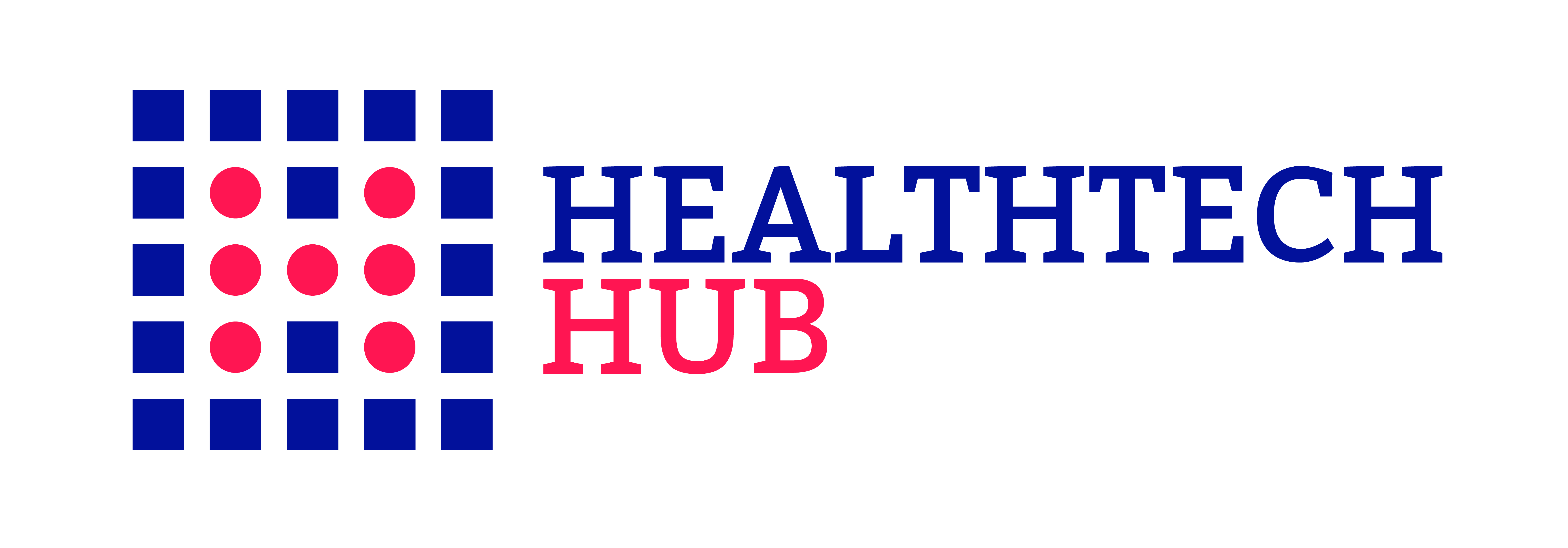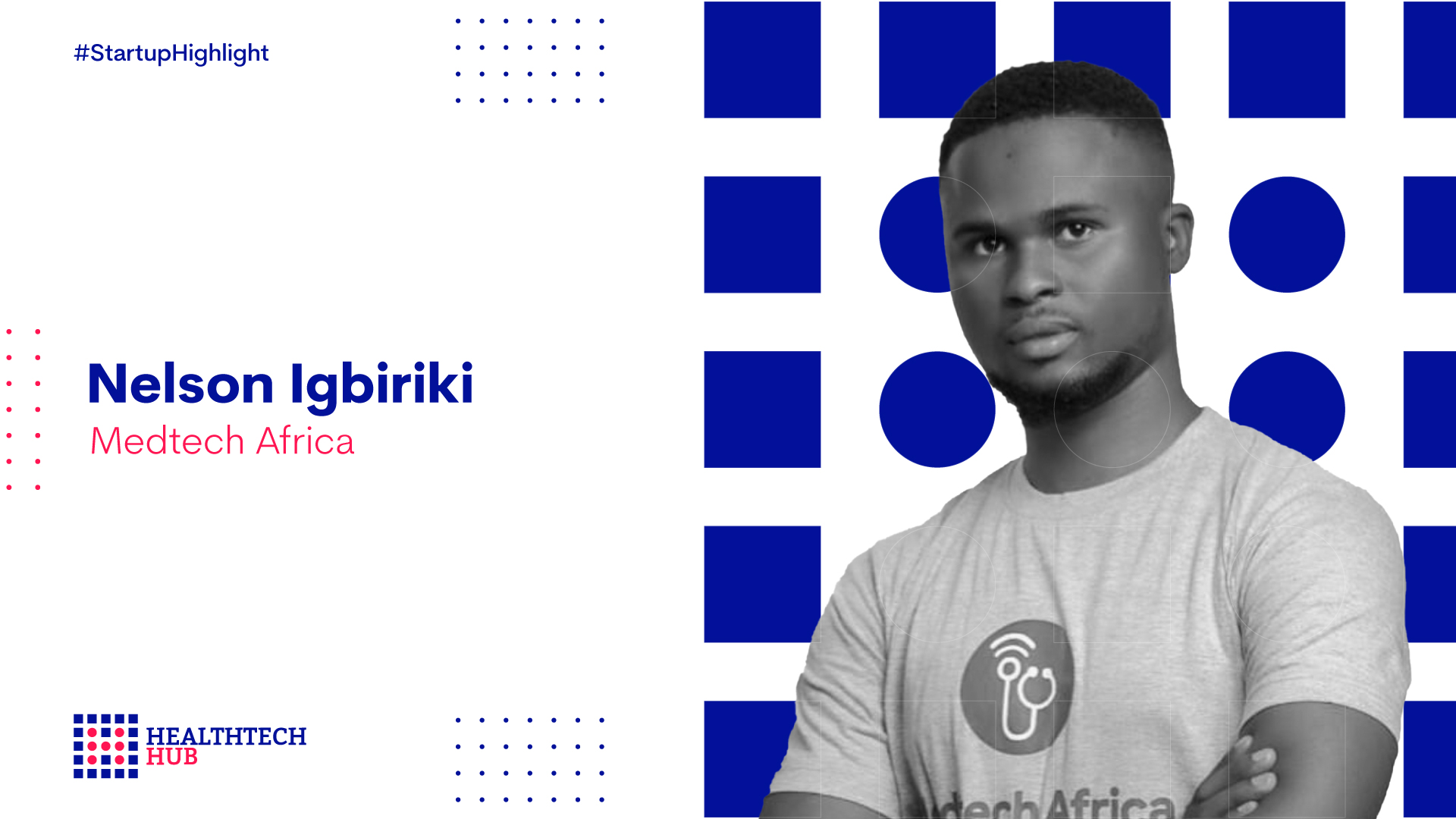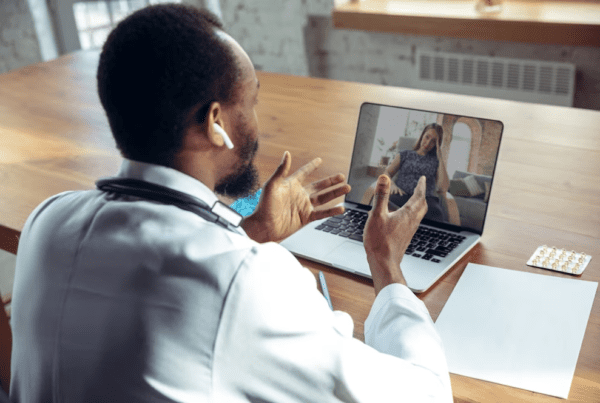Could you tell us a bit about MedTech Africa and what are the key problems it is aiming to solve?
MedTech Africa is a health-tech startup focused on using tech or innovations to solve medical issues, to bridge the gap between medicine and technology to make medical practice easy. How to provide a point of care to patients at convenience, and at the moment, we have a flagship product called Focardio. Focardio is focused on cardiovascular diseases providing access to reliable patient data for cardiovascular diseases.
Why cardiovascular disease? Because it’s the leading cause of death globally. 18.6 million people die yearly because of a lack of access to patient data to enable doctors to come in early when the patient is at the stage of getting a higher heart attack or heart failure. How will a doctor know this? It’s only when he gets access to the patient data soon enough.
Our aim is for our solution Focardio to prevent these instances for over 168 million Africans with either hypertension or diabetes. Our goal is to build a point of care for patients with these diseases and help doctors plan treatment for their patients. Patients can be at their homes and use any health monitoring devices. It could be connected to devices such as Apple watches and Samsung. So, our app gets this data from any device or software and can send it to a doctor in real-time.
On the hospital platform, we have a solution where doctors can use AI to detect abnormal activity and forecast the instances of patients having a heart attack in the next five to ten years. The AI could monitor the patients on their behalf as long as they send their data to us.
We also ensure comparison in such a way a patient has a reminder in their system where he gets notified in the morning, takes a blood pressure or, maybe, takes a jog, or they have a target for exercise. For instance, jog 2 kilometers for this week, and after they achieve that, the app can pull data from any of the devices; it could be an apple watch and can be able to pull it and track the progress of what has been achieved, this has been your progress. So, it’s a total package that we currently provide with MedTech Africa focused on cardiovascular diseases. Yeah, so that’s about it.
How can AI and technology improve healthcare outcomes? (Speaking about how digital technology has the potential to address a wide range of public health issues)
Yeah, so we humans are limited. If we consider the patient-to-doctor relationship in Africa, let’s say, for instance, in Nigeria. Yesterday, a report was released that Nigeria has less than twenty-four thousand doctors for over two hundred million population. Now imagine, let’s say, for instance, that only 10% of the population falls sick in three months; the workload will increase to 10,000 patients per doctor, which is just 10 %.
Now the role Artificial intelligence will play in this is to help reduce the workload of doctors and help increase provided instances of more personalized care and more predictive care because doctors to patients ratio is very low, the worst of this kind we have ever had in the country. We have few medical health professionals to provide health and, if you look at it, even infrastructures.
Do we have hospitals? Are our hospitals updated? Do we have the tools to support patients? Can patients get care from any point in the media, or could they travel to another country, within the continent, or within the location to get care?
AI will play a significant role. It has already started to play a big role in getting personalized care with just a few patients’ to-doctor contacts. We could also get more reliable care or predictive care. We should be able to understand more about Africans. One of the significant factors we’ve seen so far is that. We’ve seen a lot of billions being spent, for instance, in the US, for insurance of patients for drugs, medication, treatment, and rest, and that has been done majorly with Artificial Intelligence. Africa, we are going to that stage where we will have to learn: Are the drugs we are selling to our patients really effective? Is the care we are giving, is it accurate? Or are we just using generic knowledge?
How reliable is our conventional treatment that we are giving? The drugs patients are taking, are they really tailored for us Africans considering our genetics, considering our environment, considering our family history? So, a lot of things have pushed and ushered in.
Covid has done a big one for us. People continue to adopt technology in healthcare. Telemedicine has been widely adopted, and it made people accept telehealth and telemedicine. We could see instances of robotics surgery, remote surgery, and a couple of doctors in the US supporting doctors in Nigeria doing operations and surgeries that have never been done in the continent and sharing knowledge in real-time. I think AI will increase healthcare accessibility from any place across the world.
I also think there’s more to be done, and there is a big future for Artificial Intelligence in Africa, especially with the look of organizations like the Novartis foundation, AstraZeneca, and the rest doing a lot of research in Africa. Much funding has been coming into more digital tech and innovation to deepen tech made and tailored for Africans. So, yeah.
What does being in Norrsken and Novartis Foundation’s HealthTech Hub mean for the company’s mission and vision (MedTech Africa)?
One of the principal strengths of any business, startup, company, is the network. Novartis is one of the most extensive networks we have ever achieved. Through the network access to global institutions that have networks across the world. For instance, we had opportunities to speak at the Intelligent Head Summit in Switzerland; we got opportunities to connect you directly to key stakeholders across the continent.
Another thing that is happening is that when most people go to check our website or read the bio and see, oh! Novartis backs you!! There is this sense of confidence that, oh, Novartis is behind you guys, okay, makes another sense. That means you guys are doing something outstanding. So, it sends a little bit of morale, and when you say “part of Novartis HealthTech Hub accelerator,” it gives you credibility, and I think one of the things I’ve been able to develop more in this situation. It’s giving me a lot of access, for example, to the Nigerian cardiac society.
I could walk with Novartis Nigeria; I spoke with one of the teams, and they led me to somebody. I was in Dubai two weeks ago, and I talked to somebody, and I mentioned Novartis, and he said, “oh! you should know so, so and so, let’s go and meet them”. And because of that, He connected me to somebody, the biggest catch we have from Novartis Foundation and the HealthTech Hub. It’s access to the network, and you usually don’t need to do a lot of things for you to explain much about yourself. You mention Novartis, and nobody will start questioning your credibility. Like, are you sure you are real? Are you sure you are that? It builds a lot of confidence, morale, and we are very grateful for this opportunity.
What are the biggest challenges you think you might face as a company right now, and how has being part of the HealthTech Hub, Norrsken, and Novartis Foundation, solved some of these challenges….? in the realization of digital and data-driven technologies’ potential in healthcare?
I think I will start this way. So, Initially, when we got into the HealthTech Hub. We have not started anything at all. We were doing marketing research, speaking to customers, doctors, cardiologists, and patients, surveys, and just getting data to ensure what we were building. When we started, one of the great things we had was an opportunity was one of the speakers we had during this session, and I sent an email, and I was like, “I want to learn more about the business model and value proposition before we start building.”
Furthermore, he was like, “Oh! Talk to this guy! One of the biggest things I gained from this was that I could talk to many people, including engineers and funders in the HealthTech space.
Secondly, we got a grant of 20,000 dollars from Novartis, one of the prize money; we were the second prize winner, and that was enough for us to start building. We got many ideas, saw many frameworks, and met mentors who led us in the right direction.
For instance, we were able to complete our clinical validation in a short time. We did not have to spend much money because we were able to speak to some founders in our cohort that may be worked in a company that has done clinical validation around patient data or maybe did something similar and not like this to be able to share ideas and knowledge and to be able to push forward.
The HealthTech Hub helped with some of the challenges. However, there are other challenges we are having: access to capital. HeathTech is not fintech. With fintech, you build many things leading to money in three months, but with HealthTech, a lot has to be done around that end. It has not been that easy with the fundraising, but we are progressing with it; we have gotten a lot of good responses.
Furthermore, some of our challenges for Nigeria are regulatory concerns because we are dealing with the most sensitive data essential to human health—patient vitals, like their blood pressure and medical history. The government could hear what we were doing from all the media and the showcase the HealthTech has done. The Ministry of Digital Communication called us in Nigeria to see, okay, how can we help get this done. How can we help foster complete studies of digital or privacy that are needed for you to build this? And it is one of the challenges.
So basically, these are the few challenges we had, and we are a working progress. The more you face a challenge, the more you learn how to solve it. After solving it, you will meet another challenge at the front, and the more you solve, meet more challenges ahead of you.
What would you say about the growth of health tech-enabled solutions in Africa? And what are the recommendations you could give to the early startups in the field?
So, the growth of healthcare. Let me start with the growth of healthcare generally. We saw a spike in Covid, but after the era of covid, African health dropped. I do not know why; maybe it is because of the FOMO of not missing out on healthcare building, the next big thing in healthcare, and it dropped. Without health, you cannot do anything; if you are not in good health, you cannot do anything; you probably begin to realize this.
My advice to people who want to come into the healthcare space. If you want to do a startup, I would advise try and work on your startup for at least three months to get an idea of how things work because if you choose to work in a multinational company, that experience will not work in running a startup. You will face many challenges. You have to build the culture from scratch, and you have to build the ethics of your company, you have to build the bureaucracy.
Like they will tell you no to your face, “you are building trash.” Someone told me that “your idea is worth it.” I do not want to use the word, but let me say it “Piece of shit” that is what someone told me. “Your idea is a worthy piece of shit.” That’s what someone told me! Sorry for the foul language. The shock is that I met this guy in Dubai.
We were the semifinalists at the completion. We all met in Dubai, and progressed higher than him, and He looked at me and said, “You have the craziness” I was not building for you; I was not building for your validation. I have a problem causing leading death worldwide; I was not building for your validation, sir. You are gonna meet a lot of them. This is one of the scenarios, and people will tell you trash. When you succeed, everybody will want to congratulate you and want to associate with you. However, there were days when you would get 90 % of trash talk, and just maybe 10 % would be from your family.
That is me sharing what I have seen, and what I have known is me being honest with myself. So you are going to face this a lot of the time. You know why you are building and know when to pivot and switch when things are not working. You have to discern when to let go or fire someone not doing well and know when to do that. Sometimes you might be stubborn.
The Health Tech Hub’s mission is to provide a network for innovators to tap into as they tackle pressing health issues and develop virtual health and care. Looking ahead, where do you see it in the next 5-10 years in its realization of its mission?
When you see the Hub is the first in Africa, it is very strategic for it to position itself in health-tech. I have seen many people reaching out to me. For instance, with the new application that is out, I have met many people who reach out to me and say, “Oh! we heard that you are part of HealthTech Hub, we are building a solution around health-tech, and we want to be part of it!” and I think it is not out there, big like YC or TechStars. However, it is focusing on one of Africa’s biggest challenges. The HealthTech Hub is a bridge building the top innovators around healthcare in Africa. I am also proud, and I am hopeful that I will be one of the first unicorns from the HealthTech Hub on the continent that could build unicorns, health-tech unicorns; we do not have a lot of them, just two or three in the continent, and I think they have what it takes to build this program, I have gone through the program.
Furthermore, the HealthTech Hub facilitates Africa’s new digital health era. We have many areas for improvement in healthcare infrastructure, talent, and the bridge between medicine and technology, and we have a big gap there.
The value proposition of the HealthTech Hub bridges the gap between our infrastructure deficit in Africa regarding healthcare technology’s ability to foster growth. We need to take healthcare from the obscure level we are at to become a digital planet, a digital continent. We have over 1.2 billion persons on this continent, I see it as the future essentially, and it is very intentional, and I love that about them; I am happy to be part of this, and I hope we get to grow as we move forward, we get to attract many talents, foster much change when you point at the top 10 leading healthcare companies.
I believe and feel people from the HealTech Hub that have passed through the accelerator have what it takes to excel. They are very intentional and clear on their path.





